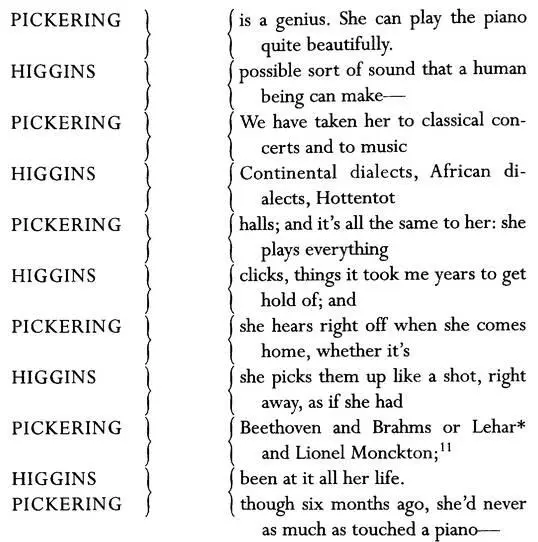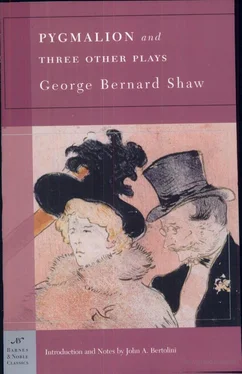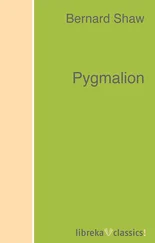CLARA Ha! ha! [She goes out radiant, conscious of being thoroughly up to date, and is heard descending the stairs in a stream of silvery laughter].
FREDDY [to the heavens at large] Well, I ask you — [He gives it up, and comes to MRS. HIGGINS]. Good-bye.
MRS. HIGGINS [shaking hands] Good-bye. Would you like to meet Miss Doolittle again?
FREDDY [ eagerly ] Yes, I should, most awfully.
MRS. HIGGINS Well, you know my days.
FREDDY Yes. Thanks awfully. Good-bye. [He goes out].
MRS. EYNSFORD HILL Good-bye, Mr. Higgins.
HIGGINS Good-bye. Good-bye.
MRS. EYNSFORD HILL [to PICKERING] It’s no use. I shall never be able to bring myself to use that word.
PICKERING Dont. It’s not compulsory, you know. Youll get on quite well without it.
MRS. EYNSFORD HILL Only, Clara is so down on me if I am not positively reeking with the latest slang. Good-bye.
PICKERING Good-bye [They shake hands].
MRS. EYNSFORD HILL [to MRS. HIGGINS] You mustnt mind Clara. [PICKERING, catching from her lowered tone that this is not meant for him to hear, discreetly joins HIGGINS at the window]. We’re so poor! and she gets so few parties, poor child! She doesnt quite know. [MRS. HIGGINS, seeing that her eyes are moist, takes her hand sympathetically and goes with her to the door]. But the boy is nice. Dont you think so?
MRS. HIGGINS Oh, quite nice. I shall always be delighted to see him.
MRS. EYNSFORD HILL Thank you, dear. Good-bye. [She goes out ].
HIGGINS [eagerly] Well? Is Eliza presentable [he swoops on his mother and drags her to the ottoman, where she sits down in ELIZA’s place with her son on her left ]?
PICKERING returns to his chair on her right.
MRS. HIGGINS You silly boy, of course shes not presentable. Shes a triumph of your art and of her dressmaker’s; but if you suppose for a moment that she doesnt give herself away in every sentence she utters, you must be perfectly cracked about her.
PICKERING But dont you think something might be done? I mean something to eliminate the sanguinary element from her conversation.
MRS. HIGGINS Not as long as she is in Henry’s hands.
HIGGINS [aggrieved] Do you mean that my language is improper ?
MRS. HIGGINS No, dearest: it would be quite proper — say on a canal barge; but it would not be proper for her at a garden party.
HIGGINS [deeply injured] Well I must say —
PICKERING [interrupting him] Come, Higgins: you must learn to know yourself. I havnt heard such language as yours since we used to review the volunteers in Hyde Park twenty years ago.
HIGGINS [sulkily] Oh, well, if you say so, I suppose I dont always talk like a bishop.
MRS. HIGGINS [ quieting Henry with a touch] Colonel Pickering: will you tell me what is the exact state of things in Wimpole Street?
PICKERING [ cheerfully: as if this completely changed the subject] Well, I have come to live there with Henry. We work together at my Indian Dialects; and we think it more convenient —
MRS. HIGGINS Quite so. I know all about that: it’s an excellent arrangement. But where does this girl live?
HIGGINS With us, of course. Where would she live?
MRS. HIGGINS But on what terms? Is she a servant? If not, what is she?
PICKERING [ slowly ] I think I know what you mean, Mrs. Higgins.
HIGGINS Well, dash me if I do! Ive had to work at the girl every day for months to get her to her present pitch. Besides, shes useful. She knows where my things are, and remembers my appointments and so forth.
MRS. HIGGINS How does your housekeeper get on with her?
HIGGINS Mrs. Pearce? Oh, shes jolly glad to get so much taken off her hands; for before Eliza came, she used to have to find things and remind me of my appointments. But shes got some silly bee in her bonnet about Eliza. She keeps saying “You dont think, sir”: doesnt she, Pick?
PICKERING Yes: thats the formula. “You dont think, sir.” Thats the end of every conversation about Eliza.
HIGGINS As if I ever stop thinking about the girl and her confounded vowels and consonants. I’m worn out, thinking about her, and watching her lips and her teeth and her tongue, not to mention her soul, which is the quaintest of the lot.
MRS. HIGGINS You certainly are a pretty pair of babies, playing with your live doll.
HIGGINS Playing! The hardest job I ever tackled: make no mistake about that, mother. But you have no idea how frightfully interesting it is to take a human being and change her into a quite different human being by creating a new speech for her. It’s filling up the deepest gulf that separates class from class and soul from soul.
PICKERING [ drawing his chair closer to MRS. HIGGINS and bending over to her eagerly] Yes: it’s enormously interesting. I assure you, Mrs. Higgins, we take Eliza very seriously. Every week — every day almost — there is some new change. [Closer again] We keep records of every stage — dozens of gramophone disks and photographs —
HIGGINS [assailing her at the other ear] Yes, by George: it’s the most absorbing experiment I ever tackled. She regularly fills our lives up; doesnt she, Pick?
PICKERING We’re always talking Eliza.
HIGGINS Teaching Eliza.
PICKERING Dressing Eliza.
MRS. HIGGINS What!
HIGGINS Inventing new Elizas.

{55} 55 11 (p. 424) “Lionel Monckton”: This English composer (1861-1924) wrote the hit musical comedy The Arcadians, which ran in London from 1909 to 1911; Monckton’s most popular airs would have been familiar to Londoners like Higgins and Eliza.

* Franz Lehar (1870-1948), Hungarian composer of operettas; a contemporary of Shaw.
MRS. HIGGINS [putting her fingers in her ears, as they are by this time shouting one another down with an intolerable noise] Sh-sh-sh — sh! [They stop].
PICKERING I beg your pardon. [He draws his chair back apologetically] .
HIGGINS Sorry. When Pickering starts shouting nobody can get a word in edgeways.
MRS. HIGGINS Be quiet, Henry. Colonel Pickering: dont you realize that when Eliza walked into Wimpole Street, something walked in with her?
PICKERING Her father did. But Henry soon got rid of him.
MRS. HIGGINS It would have been more to the point if her mother had. But as her mother didnt something else did.
PICKERING But what?
MRS. HIGGINS [ unconsciously dating herself by the word] A problem.
PICKERING Oh, I see. The problem of how to pass her off as a lady.
HIGGINS I’ll solve that problem. Ive half solved it already.
MRS. HIGGINS No, you two infinitely stupid male creatures: the problem of what is to be done with her afterwards.
HIGGINS I dont see anything in that. She can go her own way, with all the advantages I have given her.
MRS. HIGGINS The advantages of that poor woman who was here just now! The manners and habits that disqualify a fine lady from earning her own living without giving her a fine lady’s income! Is that what you mean?
PICKERING [indulgently, being rather bored] Oh, that will be all right, Mrs. Higgins. [He rises to go].
HIGGINS [ rising also ] We’ll find her some light employment.
PICKERING Shes happy enough. Dont you worry about her. Good-bye. [He shakes hands as if he were consoling a frightened child, and makes for the door].
Читать дальше














